World EV Day Coincides With Fall In Battery Cell Prices
- By Bhushan Mhapralkar
- September 08, 2023
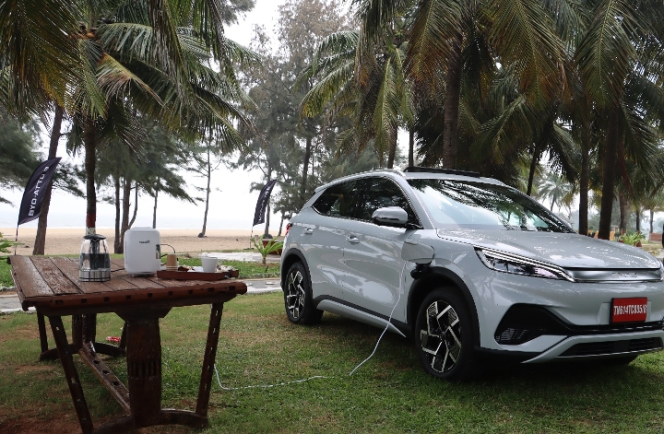
It could be termed as a fine coincidence that the World EV Day has the EV industry the world over witnessing a fall in battery cell prices below the USD 100 per kWh mark for the first time in two years. The latest average price from the Benchmark Lithium-ion battery cell price assessment is USD 98.3 per kWh approximately and the reason being attributed is the near halving of Lithium prices in China as its economic continues to slowdown.
For India, which is touted as the world’s fastest growing electric micro mobility market in the world, the news should make the electric vehicle industry happy even though not many would be keen to immediately pass on the benefit to its customers. In India, most electric vehicles feature Lithium-ion battery packs with cells that are sourced from China, Korea or Taiwan. Those that are being made at a very small scale have the material coming from markets such as China where the prices off late have been turning quite lucrative.
Speaking on the eve of the World EV Day, Sanjay Gopalakrishnan, Senior Vice President of Electric Passenger Vehicle Business at BYD India, said, “Today, as we mark World EV Day, we are celebrating a sustainable future in motion and charging ahead into an electrified era. Let’s embrace the power of electric vehicles to drive positive change for our planet and future generations. With the launch of our #GoGreenWithBYD campaign, we aim to inspire every individual to embrace sustainable lifestyles and contribute to a cleaner, greener future for all.”
Sameer Agarwal, Founder and CEO, Revfin Services, mentioned, “On this special day, we celebrate not just the technology but the people and communities coming together to create a sustainable tomorrow. At Revfin, we believe that the road ahead is electric, and we're driving change.”
Sandiip Bhammer, Founder and Co-Managing Partner, Green Frontier Capital, averred, “For India to truly embrace EVs, we must catalyse a nationwide ‘charging revolution’. It's not merely about rolling out electric cars; it's the backbone of power behind them which truly counts. The heart of our modern mobility lies in every strategically placed charging station and every innovative solution we bring to the table. We envision a landscape wherein electric chargers are as commonplace as our current petrol pumps, seamlessly integrated into the rhythm of daily life. It's a dance of technology and infrastructure, a harmony between innovation and tradition. An electrified road is no longer a distant dream, but a reality we must confront. This is the future India not only needs but rightfully deserves.”
Namit Jain, Co-founder and CEO, Rupyy, said, “As we commemorate World EV Day, we're reminded that we stand at a pivotal juncture akin to the early days of the internet—globally symbolised by Tesla's transformative impact and Europe's robust green policies. In India, the two-wheel electric vehicle sector has exhibited a robust growth of 60 percent in H1CY23, capturing a seven-percent market share from just 1 percent two years prior. While challenges persist—ranging from high initial costs to infrastructural gaps—the landscape is ripe for disruption. One such avenue is the evolving fintech sector, which is playing an increasingly significant role in EV adoption by streamlining financing options. From a 30 percent to 40 percent surge in EV financing penetration in recent months, fintech innovations are effectively democratising access to electric mobility. Supported by government initiatives, technological breakthroughs, and financial ingenuity, we are confident that India is steering towards a sustainable and electrified future.”
Ketan Mehta, Co-Founder and CEO, HOP Electric Mobility, expressed, “Global climate concerns have been driving nations toward sustainability. India's pledge for carbon neutrality by 2070 spurs interest in New Energy Vehicles (NEVs) like, Hydrogen Fuel Cells, Electric Vehicles (EVs), among other options. Electric Vehicles’ adoption has been gaining traction due to their lower carbon footprint and cost-efficiency. In the first-half of CY-2023, the segment has experienced consistent sales, surpassing the 100,000-unit mark each month according to government estimates. Efforts are also underway to establish a nationwide charging network by the government and companies collaboratively. We are expanding our 'HOP Infinity Energy Network’, which we piloted in Rajasthan. We are now rolling it out to other states.”
Mayank Bindal, Founder and CEO, Snap E Cabs, averred, “At Snap-E it would be fair to say that the entire company has imbibed the CSR ethos; We believe that solving some of the most pressing transportation problem for our customers in a profitable way and leading the way to help adopt sustainable practices and helping the planet are not two different goals. They are one and the same.” With about 400 plus cabs (all 100 percent EV) in operations, Kolkata based Snap-E is among the largest EV Cab fleet owners in the country.
Rajat Verma, Founder and CEO, Lohum, said, “Lohum's activities are driving change by building a sustainable supply of energy transition materials. By pioneering solutions that turn EV batteries and critical material waste into virtually infinite value, we pace toward a future that makes full use of its resources and takes accountability for our planet.”
Narayan Subramaniam, Co-Founder and CEO, Ultraviolette Automotive, mentioned, “Electric mobility in India is on the rise and we at Ultraviolette are proud of our contribution to this transformation with our flagship product - the F77. We believe the value of electric vehicle technology lies not just in functional use case segments but also in exciting, performance driven segments. India is now an emerging leader in the global EV arena demonstrating rapid EV adoption consistently. We applaud the initiatives undertaken by the government and industry to bolster this transition, including the FAME II scheme and the PLI scheme. These policies not only offer financial incentives to manufacturers and buyers but also provide crucial guidance to the ecosystem.”
Nitin Kapoor, Managing Director, Saera Electric Auto Ltd, expressed, "With 40 different types of vehicles and USD 4.23 billion market value, the Indian EV market stood at 11th position in the world on the readiness index. Thus, there is an urgent need to accelerate the EV transition of the country in line with sustainable development goals. The large market with huge domestic demand augurs a golden future for green mobility in India. Electric rickshaws, which are phenomenal in first and last-mile connectivity in metros and providing affordable commutation to sub-urban and rural populace, can further propel India’s EV industry with government support. The industry seeks a more amicable approach from the government with favourable initiatives like subsidies, lower taxes, simple financing alternatives, development of EV charging infrastructure, and establishment of uniform infrastructure standards. These measures are essential in driving India towards a more sustainable future powered by electric vehicles".
Ankit Mittal, Co-Founder and CEO, Sheru, said, "India’s EV sales are at a tipping point, with this being the first year that sales of EVs going past the five-percent mark of all vehicles sold. This is an important figure. India’s EV sector has thus crossed its infancy stage and is poised to enter the rapid growth stage. While we look back at what has been achieved with satisfaction, we must also be prepared for what is to come next. If we implement our plans and execute it well, India’s mobility sector will witness a transformation in the coming years. Sheru is leading EV sustainability from the front".
Ashish Deswal, Founder, EarthtronEV, averred, "With more people shifting to EVs, the Indian electric vehicle market size of USD 4.23 billion in 2023 is expected to grow at a CAGR of 68 percent to reach USD 152 billion by 2030. The country aims to achieve 100 percent electric mobility by 2030, which requires rapid expansion of EV charging infrastructure. Still, the charging infrastructure is not sufficient to provide an adequate pace for mobility transition. Besides, a move towards standardisation of EV charging connectors is necessary to benefit the EV charging industry and accelerate the transition to sustainable transportation".
- Eicher Trucks and Buses
- VE Commercial Vehicles
- VECV
- India Book of Records
- IBR
- Eicher Pro X
- Vinod Aggarwal
- SS Gill
- Abhishek Chaudhary
Eicher Pro X EV Completes Kashmir To Kanyakumari Journey In 6 Days
- By MT Bureau
- January 28, 2026
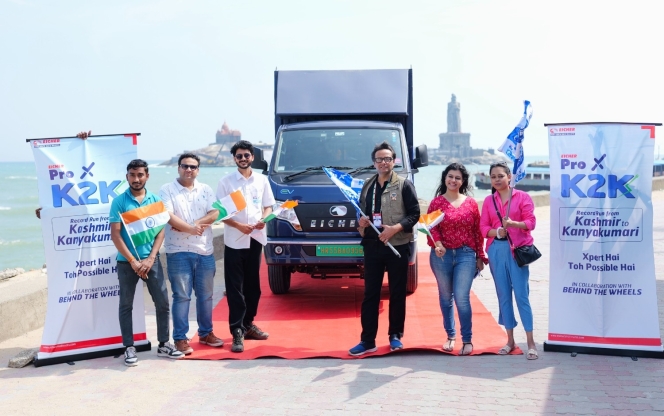
Eicher Trucks and Buses, part of VE Commercial Vehicles (VECV), has completed a journey from Kashmir to Kanyakumari using its Eicher Pro X EV.
The record verified by the India Book of Records (IBR), saw the electric vehicle cover over 4,000 kilometres in 6 days under loaded conditions. The run commenced in Srinagar on 20 January 2026 and concluded in Kanyakumari on 26 January 2026, traversing the Himalayas, plains and the Deccan Plateau.
Throughout the expedition, the vehicle utilised public chargers located via the MyEicher App. An adjudicator from the India Book of Records accompanied the truck to monitor route compliance, load, distance and charging stops. The mission served as a demonstration of electric vehicle endurance across diverse altitudes and climates to validate the technology for logistics corridors.
The journey was intended to show that electric commercial vehicles can operate beyond short-haul deliveries. By maintaining performance across hilly and coastal routes, the Pro X EV aimed to establish total cost of ownership (TCO) benefits and maintenance predictability for fleet operators. The successful completion of the route suggests that current charging infrastructure can support long-haul electric freight movement.
Vinod Aggarwal, MD & CEO, VE Commercial Vehicles, said, “For more than four decades, Eicher trucks and Buses have earned customer trust through leadership in fuel efficiency and application-specific engineering. The record-setting performance of the Eicher Pro X reinforces our unwavering focus on application excellence, reliability, and performance, anchored in robust product development and manufacturing capabilities, and enabled by a customer-centric, pan-India commercial and dealer network. I commend the entire Eicher team for achieving these well-deserved records”.
SS Gill, Chief Commercial Officer, VE Commercial Vehicles, said, “By covering the K2K route with a loaded Pro X EV, Eicher Trucks & Buses has proven that electric mobility is no longer restricted to short-haul, ‘last-mile’ deliveries. We are not just setting records, but through the strength of our service network and extensive dealer set-up, we are demonstrating that our EV technology is commercially viable, reliable, and has the range to serve as the backbone of India’s green logistics corridors”.
Abhishek Chaudhary, SVP – SCV Sales & Marketing, VE Commercial Vehicles, said, “The Eicher Pro X EV was put to the ultimate test – covering over 4000 kilometres across diverse climates and challenging altitudes. With this recognition from the India Book of Records we’ve moved beyond our own stringent testing benchmarks to real-world validation - Demonstrating that Eicher Pro X EV is a dependable partner for logistics movement across varied operations in India”.
- Montra Electric
- Murugappa Group
- PM E-Drive Scheme
- Rhino 5538 EV 6x4 Tractor trailer
- Narendra Modi
- H D Kumaraswamy
- Arun Murguappan
- Sathia Raj
- UltraTech Cement
Montra Electric Becomes First OEM To Receive PM E-Drive Certification For Heavy Trucks
- By MT Bureau
- January 28, 2026
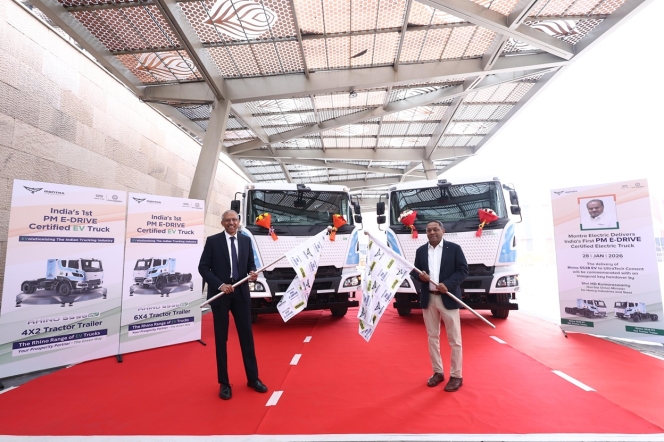
Montra Electric, the electric medium and heavy commercial vehicle business of the Murugappa Group, has become the first manufacturer in India to receive certification for heavy-duty electric trucks under the government's PM E-Drive Scheme.
To mark the achievement, the company delivered a Rhino 5538 EV 6x4 Tractor trailer to UltraTech Cement. The handover took place in the presence of Arun Murugappan, Chairman of Montra Electric and Sathia Raj, Chief Procurement Officer of UltraTech Cement.
The PM E-Drive scheme includes a budget of INR 5 billion specifically for electric trucks, providing a benefit of up to INR 960,000 per vehicle for the Rhino 5538 EV. This incentive is intended to lower operating costs and reduce exposure to fuel price volatility for fleet operators in the logistics, mining, and manufacturing sectors. The Rhino 5538 EV range is designed for Indian conditions and is available in 6x4 and 4x2 variants.
The Rhino 5538 EV 4x2 variant features a 282 kWh LFP battery that produces 380 HP and 2000 Nm of torque. It offers a range of approximately 198 km under standard test conditions and supports six-minute battery swaps. These specifications suit the vehicle for high-utilisation applications in ports, steel plants, and cement logistics.
H D Kumaraswamy, Union Minister for Heavy Industries, said, "The PM E-Drive scheme is a testament to the growing prowess of Indian innovation in the heavy-duty electric vehicle segment. Under the visionary leadership of Prime Minister Narendra Modi, we are committed to decarbonizing our logistics and making India a global hub for EV manufacturing. Electric trucks are pivotal to our Net Zero goals, and by fostering a self-reliant ecosystem through such certifications, we are driving the spirit of Atmanirbhar Viksit Bharat. We are very happy to see our Prime Minister’s vision coming to life with the 1st PM E-Drive certified heavy duty electric truck from 'Montra Electric' getting delivered today."
Arun Murugappan, Chairman, Montra Electric, said: “Decarbonising freight is one of the most critical challenges in India’s energy transition. We are grateful to the Government of India and our Prime Minister Narendra Modi for introducing forward-looking and progressive policy frameworks such as the PM E-Drive Scheme, which represent a welcome and transformative step in accelerating this shift, particularly in heavy commercial vehicles where emissions intensity is high. At Montra Electric, we are proud to contribute to this national mission by delivering technologically advanced, reliable, and scalable electric M&HCV solutions that can drive meaningful and lasting change in India’s mobility ecosystem.”
- Chartered Speed
- EKA Mobility
- PM E-Drive Scheme
- Bengaluru Metropolitan Transport Corporation
- Sanyam Gandhi
- Rohit Srivastava
- electric bus
Chartered Speed And EKA Mobility To Deploy 1,750 Electric Buses In Bengaluru
- By MT Bureau
- January 28, 2026
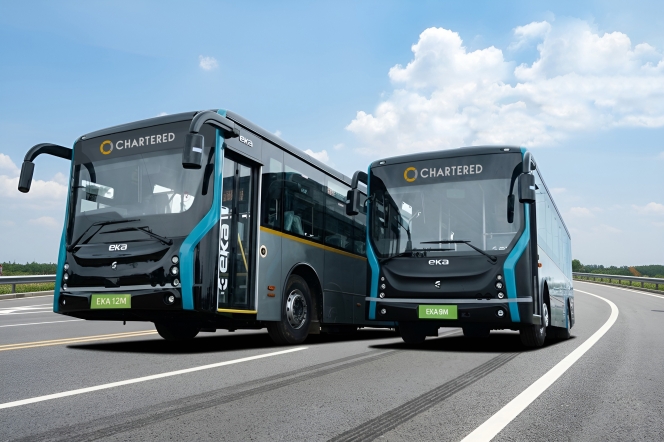
Chartered Speed and EKA Mobility have received a Letter of Confirmation of Quantity (LOCQ) to deploy 1,750 electric buses in Bengaluru under the PM E-Drive Scheme. This allocation accounts for approximately 39 percent of the city's total planned induction of 4,500 electric buses. The initiative is part of the Bengaluru Metropolitan Transport Corporation effort to expand its network in line with the decarbonisation roadmap of the Government of India.
The partnership combines the operational services of Chartered Speed with the vehicle manufacturing and technology of EKA Mobility. Operational protocols for the fleet include maintenance, battery monitoring, and driver training. Chartered Speed has stated its intention to transition 25 percent of its total fleet to electric power by Fiscal 2027.
The deployment aims to support public transport infrastructure in the region through investments in charging and maintenance facilities. Bengaluru is currently expanding its electric transport capacity to meet state mobility targets. The project focuses on providing urban transport solutions for the city's commuter base while reducing the carbon footprint of the public system.
Sanyam Gandhi, Whole-Time Director, Chartered Speed, said, “Bengaluru is a key mobility hub in India, and electric buses are part of the efforts to build a cleaner and more efficient public transport system. The PM E-Drive allocation strengthens Chartered Speed Limited’s long-term commitment to sustainable mass mobility. As one of the early adopters of e-mobility, we aim to convert around 25% of our fleet to electric by Fiscal 2027, supported by strong infrastructure investments to deliver commuter-centric services aimed at lasting socio-economic impact.”
Rohit Srivastava, Business Head & Chief Growth Officer, EKA Mobility, added, “The PM E-Drive initiative is a powerful enabler of India’s electric mobility vision, and Bengaluru’s large-scale adoption of electric buses sets a strong benchmark for urban transport transformation. At EKA Mobility, we are proud to partner with Chartered Speed and contribute to Bengaluru’s journey towards a more sustainable urban future. It is not just about scale, but about creating cleaner mobility solutions, quieter streets, and a better daily commute for millions.”
Suzuki Opens Second Biogas Plant In Gujarat
- By MT Bureau
- January 20, 2026
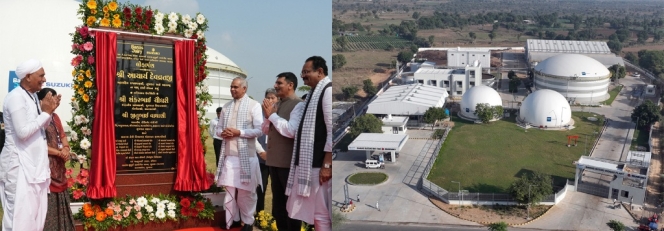
Suzuki Motor Corporation and its subsidiary, Suzuki R&D Centre India (SRDI), have inaugurated the Banas Suzuki Biogas Plant in Bhukhala, Gujarat. The facility, which opened on 18 January 2026, is the second such plant following the Agthala site that commenced operations in December 2025.
The plant is designed to process up to 100 tonnes of cow dung per day to produce approximately 1.5 tonnes of biogas. This output is equivalent to the daily fuel requirements of 850 compressed natural gas (CNG) vehicles. In addition to fuel production, the facility will sell organic fertiliser generated as a byproduct of the process.
The project is part of an agreement signed in September 2023 between SRDI, the National Dairy Development Board (NDDB) and Banas Dairy. The partners have agreed to construct a total of five biogas plants in the region. The Bhukhala site covers an area of 27,000 square metres and forms a component of Suzuki’s strategy to support carbon neutrality in India.
The use of biogas serves as a carbon-neutral alternative for CNG vehicles, which currently represent 20 percent of the Indian passenger car market. Beyond emission reductions, the initiative is intended to improve energy self-sufficiency and increase rural income through the purchase of cattle waste from local farmers.
The opening ceremony was attended by Acharya Devvrat, Governor of Gujarat and Shankar Chaudhary, Chairman of Banas Dairy and Speaker of the Gujarat Legislative Assembly. Representing Suzuki was Kenichiro Toyofuku, Managing Officer and Executive General Manager of Biogas Operations.
The company stated that it will continue to develop its biogas business to contribute to national growth and environmental targets. The operation is expected to create jobs within the district while providing fuel for high-demand vehicle segments.







Comments (0)
ADD COMMENT